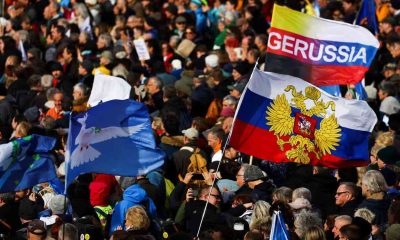German Politicians Criticize Anti-Russian Sanctions

All Global Research articles can be read in 51 languages by activating the Translate Website button below the author’s name.
To receive Global Research’s Daily Newsletter (selected articles), click here.
Click the share button above to email/forward this article to your friends and colleagues. Follow us on Instagram and Twitter and subscribe to our Telegram Channel. Feel free to repost and share widely Global Research articles.
***
A leading German parliamentarian stated that his country should not impose sanctions on Moscow, as Russian-German energy cooperation is important for national stability. According to him, without Russian gas, the German economy is threatened and becomes heavily dependent on “green” technologies that are not yet fully developed.
The criticisms were made by the leader of the “Alternative for Germany” (AfD) party, Anton Baron, during an interview for the Stuttgarter Zeitung on August 11. Baron asserted that Germany should not put the West’s anti-Russian agenda ahead of the country’s economy and energy security. The politician believes that by buying Russian gas, Germany is not contributing to the continuation of the conflict, thus contradicting the Western narrative that Moscow must be boycotted to “stop the invasion”.
“Russian gas was a blessing for the [German] economy and our prosperity (…) [Also,] to say that by using [Russian gas] we are financing Putin’s war is nonsense (…) We cannot make it [the German economy] dependent on war conditions – it’s a pure necessity”, Baron told journalists during the interview.
Baron also strongly criticized the German decision not to invest in nuclear energy and to focus on the development of “green” technologies. This decision, according to him, is anti-strategic and strongly harms the country, making it dependent on technologies that have not yet been entirely developed, failing to meet German demands for energy security.
“We switch off nuclear power plants and coal-fired power plants, relying more and more on renewable energies, even though there are no storage facilities,” he added.
Baron is a well-known critic of the Western “green” agenda and its negative impacts on German national interests. In another recent statement on this topic, he “pointed out that hydrogen technology might still need decades to mature, criticizing the simultaneous decommissioning of reliable nuclear power plants”. Indeed, this has been another sensitive topic in the country, since, given the absence of Russian gas, nuclear energy could be used to at least alleviate the effects of the energy crisis. But any possibility of nuclear development is blocked in the country by the “ultra-green” agenda that controls German politics.
In fact, these criticisms have become increasingly frequent. The boycott of Russia and the irresponsible advancement of the “green” agenda are causing serious problems in Germany, threatening the EU’s leading economic role that the country plays. By 2022, 40% of German gas needs were met by Russia, which made Moscow an indispensable partner for the German economy, especially in the industrial sector. However, Berlin irresponsibly approved all EU sanctions packages imposed on Russia and fully joined the Western attempt to “cancel” Moscow.
As a result, Germany has become the country most affected by the effects of sanctions – much more so than Russia itself, whose economy has recently overtaken Germany’s. Also, in early August, the German group of gas storage operators INES released a report predicting gas shortages by the winter of 2026-2027, which is raising serious concerns among experts.
This has prompted criticism from several German politicians. Baron is not alone in his stance, with many other lawmakers also echoing popular dissatisfaction with the sanctions. For example, recently, Member of Parliament (MP) Uwe Schulz stated:
“Sanctions against Russia… are leading Germany and its economic activity straight to de-industrialization (…) [Germany] lift economic sanctions against Russia [in order to] prevent [further] economic damage.”
Also, in June, another AfD politician, MP Markus Frohnmaier, classified the current German economic policy as “carefree”, stating that the people are “fed up” with the anti-Russian measures, as the Germans do not want to “pay for Kiev forever”.
However, nothing seems to change the German desire to continue an absolutely “suicidal” economic and foreign policy. Unlimited support for Ukraine, considered a “priority” by the German government, is leading the country to a catastrophe. Berlin is already in a technical recession, with inflation rates worsening every month and without any expectation of a reversal in the economic scenario for the coming years. But even so the main discussions of the German government are about new ways to punish Russia and help Kiev, with no concern for German citizens.
Indeed, increased criticism of the German government is inevitable. The popular demand for changes tends to raise more and more. Despite being serious, the German crisis has not yet reached its most critical point, as there are expectations of a significant worsening in the short term. And if the German government does not act in time to avoid the most catastrophic effects of this crisis by reviewing its economic and international guidelines, the country risks to collapse.
*
Note to readers: Please click the share button above. Follow us on Instagram and Twitter and subscribe to our Telegram Channel. Feel free to repost and share widely Global Research articles.
Lucas Leiroz is a journalist, researcher at the Center for Geostrategic Studies, geopolitical consultant. You can follow Lucas on Twitter and Telegram.
Featured image is from InfoBrics

